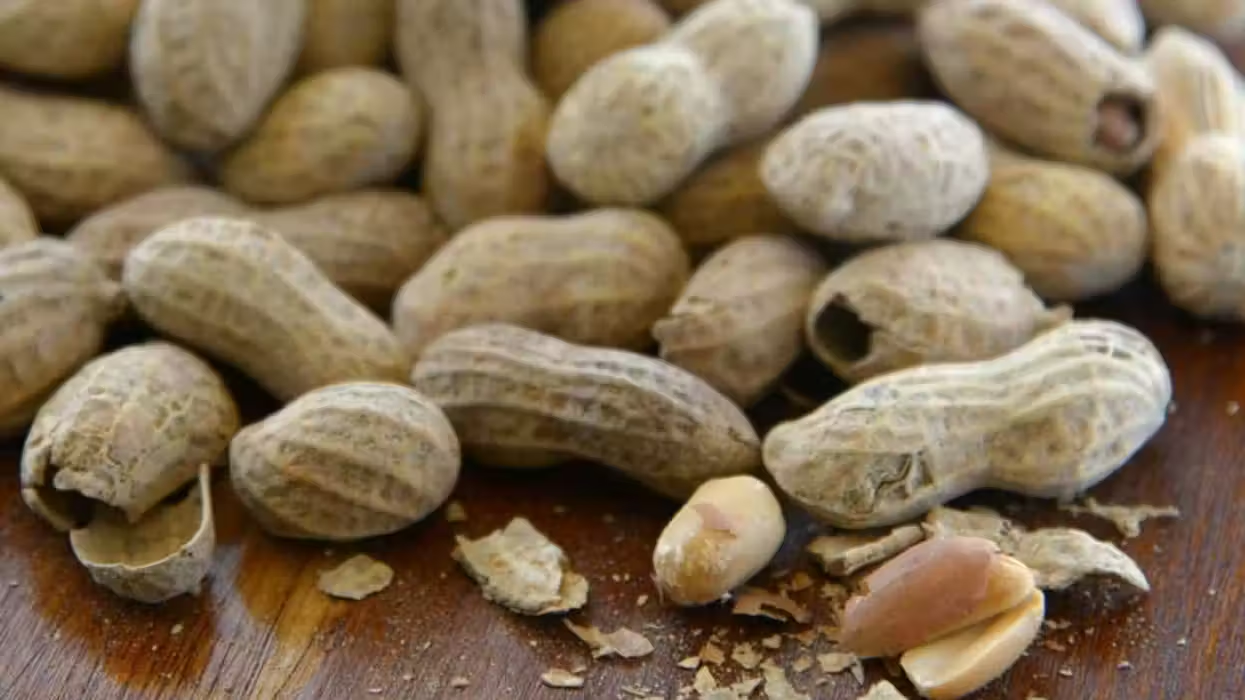
Posted on 10/25/2025 6:19:07 PM PDT by Red Badger

It turns out that more peanut exposure earlier on means fewer allergy cases later. Health experts suggested in years past that mothers with familial predispositions to developing allergies should avoid peanut consumption during pregnancy and breastfeeding and that parents should avoid giving their children peanut products and other common allergens before the age of 3.
According to a National Institutes of Health-backed study published on Monday in the American Academy of Pediatrics' medical journal, Pediatrics, the strategy of avoidance appears to have been the wrong approach.
Background After observing the prevalence of peanut allergy among children in Western countries double over the course of a decade, an international team of researchers evaluated studies of peanut consumption and avoidance to figure out which was the better approach.
'There are less kids with food allergy today than there would have been if we hadn’t implemented this public health effort.'
The researchers, whose work was partly funded by the National Institute of Allergy and Infectious Diseases, conducted a randomized trial of peanut consumption in infants at risk for peanut allergy and found that "early introduction of peanuts significantly decreased the frequency of the development of peanut allergy among children at high risk for this allergy and modulated immune responses to peanuts."
Following the 2015 publication of the trial results in the New England Journal of Medicine, numerous health organizations issued consensus-based interim guidance recommending early allergen introduction.
Years later, the NIAID, leaning on the trial data in the 2015 study, released guidelines recommending early introduction for all infants facing low risk of developing a peanut allergy and for high-risk infants where appropriate.
Exposure therapy The new study in Pediatrics indicates that the exposure strategy was worthwhile and has resulted in a 27.2% reduction in the cumulative incidence of peanut allergy among children in the post-guidelines cohort versus the pre-guidelines cohort, and a reduction of over 40% when comparing the pre-guidelines cohort with the cohort situated after the 2017 release of the updated NIAID guidelines.
After analyzing health records from nearly 50 pediatric practices altogether tracking over 120,000 kids, the researchers behind the new study found that overall food allergy rates in kids under 3 dropped from 1.46% between 2012 and 2015 to 0.93% between 2017 and 2020.
The researchers noted further that a Canadian study found that the implementation of early peanut introduction guidelines "was associated with a significant decrease in new-onset anaphylaxis in children aged 2 years or younger."
"I can actually come to you today and say there are less kids with food allergy today than there would have been if we hadn’t implemented this public health effort," Dr. David Hill, an allergist at the Children's Hospital of Philadelphia and author of the study, told the Associated Press.
While about 60,000 kids have reportedly dodged food allergies since 2015, including 40,000 children who would have otherwise developed peanut allergies, 8% of children remain affected by food allergies. One reason the number remains high may be that only a minority of pediatricians — roughly 29% — indicated they followed the expanded guidance released in 2017.

“American Academy of Pediatrics”
Exactly, this is the same bunch who thinks it’s fine to cut the dicks off of little boys and also try to get kids to rat-out their parents regarding guns, I think.
We never heard of peanut allergies in those days either.
It wasn't until "chips" in all their various forms like Doritos became the predominant snack food that you started hearing of peanut allergies.
There is probably something to the theory of exposing children at an early age to peanuts, so that they do not develop allergies later on in life.
Common sense told us this all along.
Don’t forget, school lunch was either white bread with 1) PB&J, 2) Baloney & mayo, or 3) egg salad.
Yuppies were too superior to provide peanut butter and jelly sandwiches to kids in high chairs and they paid the price for their vanity.
Nonsense.
Our peanut butter was ground organic. The bread was 7 grain homemade. The children loved it.
Ping
My son is allergic to all tree nuts, but not peanuts.
Nutty women (pun intended) with vegan cats and transgender boys.
Munchhoausen (sp) by proxy.
No he’s not. You just never let him have any.
Peanuts are legumes. Totally different.
Granny would have us kids shelling pecans by now.
I thought this had been known now for quite some time.
Is there anything they DO know?!
Was someone questioning settled science?
Kids were started on a bite or two of solid food from their parents by six months. There was no baby food, the kid got what mom and dad was eating just mashed or pre-chewed.
This did two things it took some of the pressure off of mom to provide all the calories and it kept the kid full longer. Which let the parents sleep more.
Apparently it was also what helped keep allergies down.
Now the flip side is that any severely allergic kid would have died. Which would have meant that you would have had few children with allergies who survived to grow up.
“When I was a boy, me and my friends cracked peanuts during lunch at school and spit the shells out on the floor so the janitor had a job. For afternoon recess, we’d lure squirrels with any we had left over and kill ‘em with our slingshots. Then we’d take our Li’l Bowie knives and skin’ em, gut ‘em, and hide ‘em in our empty lunch bags in the coat room and took ‘em home at afternoon release. That night we all had squirrel stew for dinner and a head start on squirrel-skin caps for the winter! And we LIKED it!” —Grumpy Old Man
Peanuts are not a tree nut. They are legumes, not nuts. They are in the same plant family as beans, lentils, and peas, and they grow underground in pods.
Disclaimer: Opinions posted on Free Republic are those of the individual posters and do not necessarily represent the opinion of Free Republic or its management. All materials posted herein are protected by copyright law and the exemption for fair use of copyrighted works.